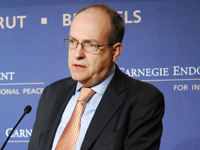Registration
You will receive an email confirming your registration.
On March 7, Iraqis will go to the polls to vote in parliamentary elections. The process leading up to the elections has been fraught with challenges. Originally scheduled for January 2010, the elections were postponed two months because of the difficulty of reaching agreement on the election law.
Ad Melkert, the United Nations Secretary General's Special Representative for Iraq, spoke recently at Carnegie and discussed conditions on the ground in Iraq and the situation surrounding its upcoming election.
The International Community
Melkert argued that ongoing international engagement is essential to Iraq, but that the nature of that engagement has changed. There must be a general recognition that the international community now plays a supportive rather than a leading role in Iraq. He cited the important advisory role played by the U.N. and the United States in the lead up to the election, where their facilitation led to the consensus necessary to achieve an election law.
Melkert acknowledged that Iraq’s neighbors also have a clear stake in the outcome of the elections, and in Iraq in general. He emphasized the need to find a balance between positive engagement and interference in Iraq’s internal politics.
The Elections
The upcoming elections, Melkert suggested, are crucial for consolidating the many gains that have been achieved recently. In the past two years, there has been a growing understanding about the way government, parliament, and general state institutions should interact and work. These improvements need to be maintained.
Melkert also spoke of the importance of increased transparency and consistency in the election process. In 2008, a law was passed which excluded persons who had held a certain rank in the Ba’ath party from standing as candidates for elections. Recently, however, there has been concern over the process by which those persons are identified and disqualified. Resolving those concerns are an important step towards reconciling the tensions that divide Iraq. However, although the de-Ba’athification exclusions have received a lot of international attention, only approximately 150 candidates were finally excluded, from a list of over 6,000.
Security
Although security has improved dramatically in recent years, violence remains widespread. However, Melkert expressed confidence that violence will not derail the election on March 7. Iraqi security forces are taking the lead in maintaining security.
After the Elections
Following the election, the Iraqi government will need to address three crucial issues:
- Relations between the Arabs and the Kurds, including the status of Kirkuk.
- The normalization of relations between Iraq and Kuwait.
- The effective management of oil revenues.
Melkert concluded with cautious optimism, praising Iraq's vibrant and free press, growing parliamentary capacity and continuing commitment to democratic processes.
